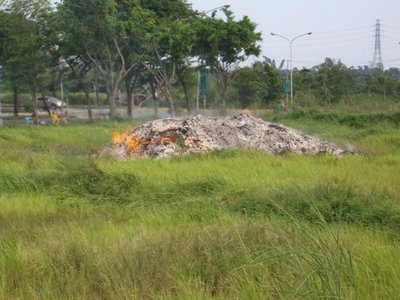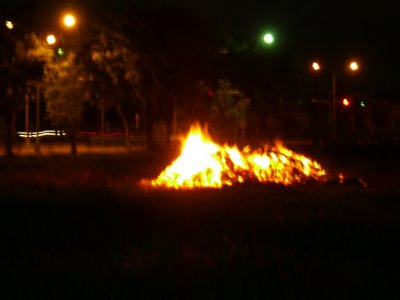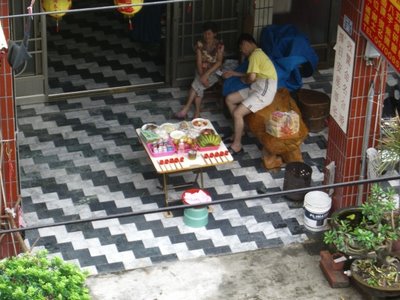
A 10-foot pile of ghost money burns beside a park as two men in lawn chairs look on.

Money is added continually during the day, and the blaze lasts until late into the night
Many of you, who are logging in from abroad and reading this blog in English, are familiar with Halloween, or All Soul's Eve. In pre-Christian times, this was believed to be the one day every year when the world of the living and the world of the dead were closest. Nowadays, Halloween is a secular holiday mostly known for costumes and kids collecting candy, or for other decidedly earthly highjinks.
In Taiwan, Halloween lasts for the duration of the seventh lunar month every year, usually covering most of the month of August. It's called Ghost Month. It begins today, and it's nowhere near as cuddly and kid-friendly as it's Western counterpart. It's serious. For a month every year, the ghosts of the not-yet reincarnated dead are released from the underworld to roam the earth, and these are not jolly ghouls. "Hungry" ghosts especially, those whose relatives have neglected to maintain their other-worldly standard of living with the proper sacrifices such as ghost feasts and ghost money, may wander the earth begging sustainance, and sometimes creating deadly mischief, venting their wrath upon anyone who happens to cross their path.

A ghost feast

The same ghost feast with a small ghost money offering
Superstitions about ghosts are remarkably pervasive in Taiwanese culture (L.A. Times article), and during ghost month especially, certain activities and behaviors are discouraged. Weddings, vacations, surgical procedures and large purchases are commonly put off during Ghost Month.
So what's the best advice for safe and happy trick-or-treating? Two that I've heard pesonally are as follows. Don't whistle after dark, because you will attract ghosts, and for men especially, resist the urge for public urination... which is practically an institution in Taiwan... because you might be peeing on someone's deceased ancestor who is roaming around in the dark.
Swimming, or spending time on or around water is highly discouraged. Many ghosts are unhappy with their plight and are looking for someone to replace them in the underworld. These ghosts may lurk around ponds, rivers, and the seaside and drown unwary swimmers or passersby. This superstition in particular is interesting, because it seems to correlate with a traditional disinterest in watersports and recreation among Chinese, and among Taiwanese in particular.
When I moved to Taiwan, Shu-Chuan and I had to move into a new house during Ghost Month. This is a serious no-no. A number of special precautions had to be taken, all of which were orchestrated by my mother inlaw. The only one that I recall in any detail was that we had to leave a light on in every room of the house, for the entire month. Of course, here in Taiwan, there is a huge market for specialty products relating to Daoist observance. It turns out that the flourescent light fixtures in our house have a special, smaller light bulb which is used for ritual purposes such as this.

the ghost light is on
Here in Zhao ming, there are at least 7 or 8 stores whose entire inventory consists of different types of ghost money. Other stores specialize in ghost money burning barrels, fireworks, and incense. The habit of burning ghost money is so widespread that it is beginning to cause environmental concerns about air quality. The rising standards of living and increases in disposable income among the living seem to have translated into rising standards of living for ghosts as well. Ghost money burning releases hundreds of tons of particulates and toxic gases into the atmosphere annually, and the resultant ash presents a waste disposal problem. Ghost money burning is currently banned in Taipei, the nation's capital, and the local government here in Kaohsiung has started a number of initiatives which are aimed at eventually curbing the impact of this practice. Last week, an article appeared in the China Post and the Taipei Times, the two leading English-language national daily newspapers, about this issue.
The initiatives focus on "creative alternatives" to ghost money, as well as "replacing money with good deeds". In recent years, as Taiwan's economy has been in transition away from heavy manufacturing, there has been an increase in environmental awareness and promoting tourism. Standards of living and vehicle emissions have risen dramatically since martial law was lifted in 1987, a rise almost as dramatic as the one currently underway in the People's Republic of China. Nearly every household owns at least one scooter, and car ownership is on the rise. More and more people in Taiwan are coming to see the environmental effects of ghost money as incongruent with a modern industrial society that already faces challenges from other, less easily mitigated sources of air pollution.
Generally, business owners will burn a small amount of ghost money on the 15th of every lunar month, just to keep the supernatural guanxi which affects their business flowing. Other observances such as god's birthdays, weddings, and funerals are times when ghost money are burned as an offering, sometimes quite lavishly. Lavish outlays are not only seen as a show of greater face to the god or ghosts, but are also a way for a family, a business, or a temple to flaunt their wealth in public.

Money to burn: a lavish outlay of ghost money at a funeral in Dong1 Gang3

Taiwan fire safety protocols in operation. Another view of the same cage placed on the shoulder of a public highway.

The next door neighbor celebrates her god's birthday with a feast and money burning...typhoon rain be damned, the god must be honored.
During Ghost Month, almost every Daoist household will burn ghost money once a week for the entire month. 2006, as it turns out, is a double ghost month. Asthma sufferers, young children, the elderly, and those with chronic respiratory problems beware... of ghosts, that is. These traditions and customs are so far entrenched into custom and the local economy that change is likely to be very slow, especially out here in the "countryside".
No comments:
Post a Comment